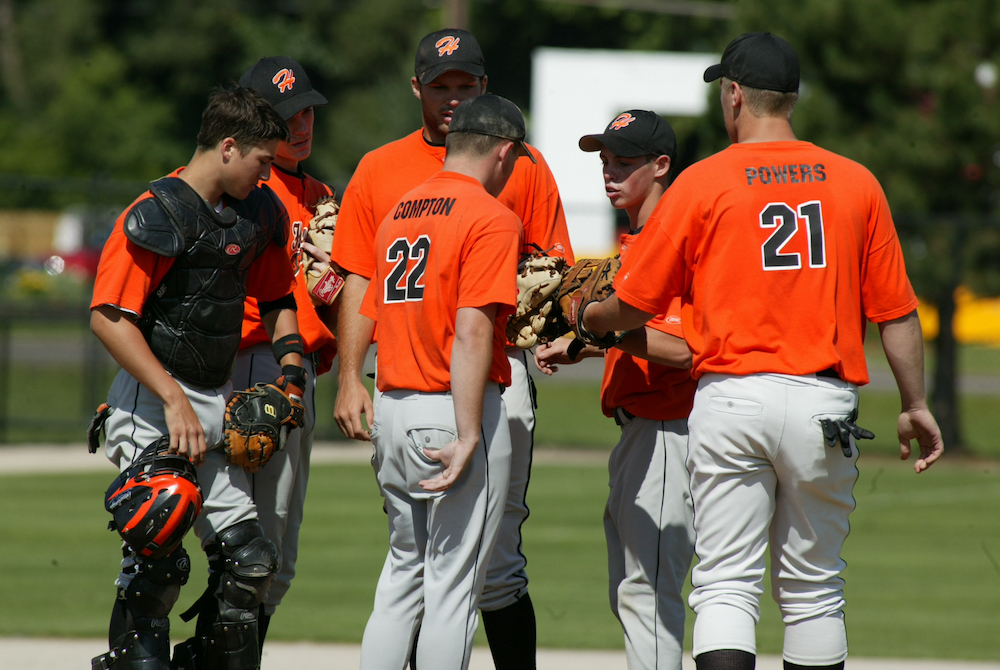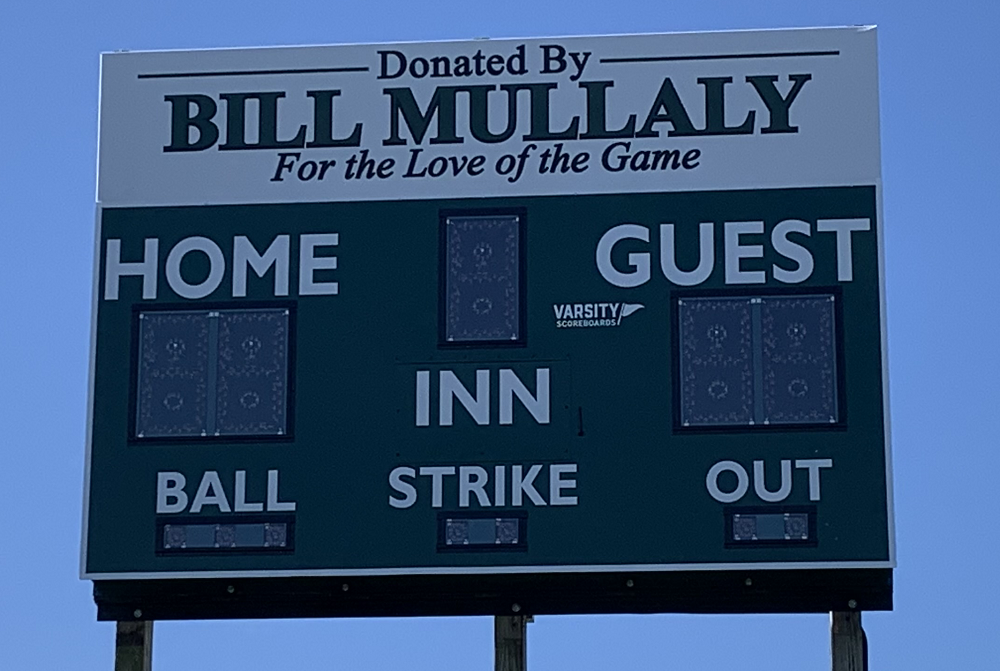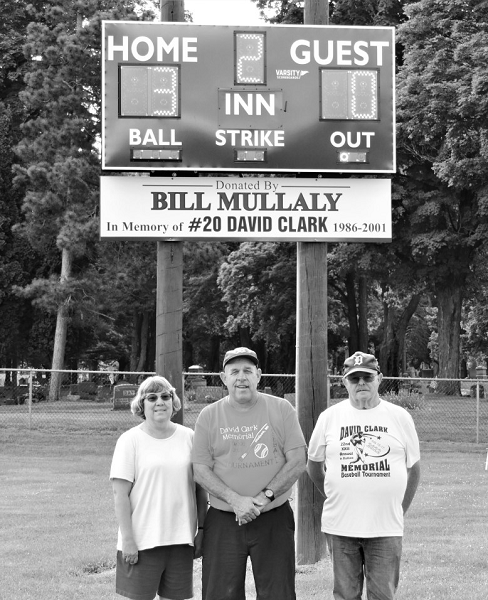
St. Mary's Record Run Recalls Homer's 'Small-Town Baseball Odyssey'
By
Geoff Kimmerly
MHSAA.com senior editor
April 21, 2023
As Orchard Lake St. Mary’s celebrated setting the MHSAA record for longest baseball winning streak at 77 and counting over the weekend – and with a national record certainly within reach this season – we can recall just two decades ago when Homer’s similar streak and the two seasons of buzz it stirred was on the verge of its start.
Homer, representing a community of about 1,700 residents, finished 38-0 on the way to winning the Division 3 championship in 2004, and then returned to win its first 37 games of 2005 before falling to Saginaw Nouvel 7-6 in that season’s Division 3 Final at Battle Creek’s C.O. Brown Stadium.
Along the way over those two seasons, the Trojans smashed the previous MHSAA baseball consecutive wins record of 56, and went on to set a national record of 75 straight wins that stood until 2011, when it was surpassed by both Martensdale St. Mary’s of Iowa and Portsmouth, N.H. The latter has topped the national list since 2012 after extending its winning streak into 2012 to the current record of 89 games.
Battle Creek Enquirer reporter Jeff Karzen followed Homer’s record run through many of its most notable moments, and that coverage and the relationships built during that time – and as the Trojans came back to win the Division 4 title in 2006 – led to his first book “Homer: The Small-Town Baseball Odyssey” published in 2011.
Below is an excerpt highlighting the small school’s run to national stardom – followed by updates on a few of the major players who helped the Trojans become unforgettable.
Buy the book here: JeffKarzen.com
***
 Homer: The Small-Town Baseball Odyssey
Homer: The Small-Town Baseball Odyssey
August Publications
Copyright © 2011 Jeff Karzen
All rights reserved
First edition published 2008
Second edition published 2012
Homer began the 2005 season ranked No. 1 in Division 3, a spot it had grabbed and held onto for the second half of ’04. Seven starters returned from a team that had made history with a 38-0 season. Still, Homer had some things to prove to itself.
So far in high school, and even as Little Leaguers, this group of Homer players had been largely defined by Josh Collmenter and Matt Powers. In big postseason games, Collmenter and Powers would take the pressure off their younger teammates and welcome it squarely on their shoulders. Collmenter was always the big-game pitcher. Powers could always be counted on in the middle of the batting order. How would Homer deal without having its two leaders?
“They definitely set the mindset for our team,” Dan Holcomb said of Collmenter and Powers. “When you’re a freshman coming up you don’t really know what varsity is all about or what Homer baseball is all about. You get up there and having those young guys playing against teams like Blissfield is kind of overwhelming. But having guys like Josh and Matt kept you loose and didn’t let you think about Blissfield, or think about seven state titles [won by the Royals]. They just said, ‘Hey guys, let’s have some fun. We’re going out to play some baseball today.’ They just made sure everyone had their mind right.”
Whether it was nerves about following up the unbeaten season with a good showing or an uneasy feeling taking the field without their two leaders, the Trojans began the new season with a close call in a doubleheader against Marshall and its star, Evan Sharpley. Marshall was a good team and a much bigger school, but Homer simply didn’t have it. Somehow, the Trojans escaped with a 14-13 win in eight innings (the most runs it had given up in years) and then a 4-2 triumph in Game Two. With the first two wins under their belt, the Trojans began to roll. Over the next 12 games, they gave up a total of 13 runs, proof that the season opener was nothing more than a fluke. Collmenter and Powers were missing, but junior-dominated Homer began to form its own identity.
The state record for consecutive wins was 56, set by Grand Haven High School from 1960-62. Homer’s Trojans were quickly nearing the record. The streak had reached 49 games when Homer took the short drive west on M-60 for a Big Eight tilt with the Union City Chargers. By now, the other teams in Homer’s conference had basically ruled out beating the powerhouse. Goals such as scoring runs, playing all seven innings without the mercy rule, and even putting the ball in play against Homer’s overpowering pitchers had become the scaled-down aspirations for the opponent.
One rival coach, Quincy’s Brett Allman, didn’t let his team watch Homer’s impressive pregame routine where the Trojan players showed off their big-time throwing arms and precision fielding. “When they warmed up, I talked to my team outside the dugout, or had them hit Wiffle balls or something,” Allman said. “Something besides watch them take infield. They put on a show. And they were proud of the way they took infield, and rightfully so. I don’t need to watch Dusty Compton throw the ball across the infield because I know what they can do. I didn’t think it would be real beneficial for my guys to watch them take infield.”
Under gray, rainy skies in Union City, both teams finished their warm-ups and looked around. Something was missing. It was going to be hard to play this game without any umpires in sight. They waited and waited. Finally, around 5 p.m., 30 minutes after the scheduled start time, one ump arrived. Knowing how much less is seen on the field with only one umpire (regular- season high-school games have two), Salow was hesitant to let the game begin. The lone umpire told both coaches that his partner was on the way, so the coaches acquiesced and allowed the game to start with one set of eyes in charge of the entire field. Union City must’ve forgotten that its opponent that day had won 49 consecutive games. The Chargers came out like they were the team to beat and jumped all over Homer. A few innings into the game, Homer was stunningly down 7-0. “I said to Tom, ‘Not only are we going to lose our streak but we’re going to get 10-runned (a mercy rule loss),’” Salow said.
Of course, Homer started chipping away at the lead. But seven runs was a lot to come back from, even for these Trojans. In the fifth inning, with Homer still trailing by a few runs, C.J. Finch decided it was time to take control of the perilous situation. “Not today! Not today!” Finch screamed. “This is not going to happen today.”
With rain continuing to fall, Homer got within one run in the sixth inning. That’s when the umpire, who worked alone all game, walked over to Homer’s dugout to speak with Salow.
“It’s not looking good, starting to rain harder. Not sure if we’re gonna be able to finish this thing,” the ump told Salow.
“Absolutely not,” the coach fired back. “We started this game 40 minutes late and if we’d started on time, it would be over by now. Not only that, but we have a streak going. These kids have worked too hard to put this streak together and they’re not going to lose it this way.”
The umpire caved in and so did Union City. Homer rallied to win 9-7, extending the winning streak to 50 games. Seven more remained to break the state record that had stood for 44 years.
“I was on pins and needles,” Union City coach Joe Tinervia said of his team’s near-miss. “I was playing that game like it was 1-0. That shows you what I think of Homer.”
A few weeks later, Homer easily topped Concord 10-0 to tie Grand Haven’s state record of 56 straight wins. The stage was set for the talented boys from the one-stoplight town to make history. A Friday doubleheader against Reading, one of the conference’s better teams, would be the record-breaker. It seemed fitting, too, because Reading had handed Homer its last loss in a regional playoff game in 2003. Homer made history in a rather ho-hum affair, winning Game 1 of the doubleheader, 12-2. “It wasn’t breathtaking or staggering or awe-inspiring,” a Battle Creek Enquirer columnist wrote the next day. “But it was efficient. Forgive Homer if it didn’t stage a large celebration for the new record. It’s just that the boys are used to winning.”
“It was just good enough, not flashy,” Salow said after his team won its 57th straight baseball game. “I’d like to think we’re a blue-collar club. It’s the way guys are taught in practice and in the classroom. We try and never get too high or too low.”
***
Where are they now?
- Josh Collmenter pitched in Major League Baseball for seven seasons, the first five-plus for Arizona before finishing his career with Atlanta. He won a career-high 11 games in 2014 and finished his pro career with a 38-35 MLB record. He currently is living in Phoenix and doing radio and TV for Diamondbacks broadcasts.
- Scott Salow left Homer and became superintendent at Petersburg Summerfield in 2021. He coached the Trojans through 2019, building a career record of 577-157.
- Dan Holcomb lives in Nashville, Tenn., and has been a Seattle Mariners scout for six seasons, covering Tennessee, Alabama and Mississippi. He spent six years as a college coach prior to scouting. He pitched collegiately at University of Evansville, Grand Valley State University and Huntingon University (Ind.).
- Dale Cornstubble is married with two kids and living in Homer. He is an electrician and teaches catching lessons on the side. He played at Central Michigan University and was drafted and played briefly in the minor leagues for the Kansas City Royals.
PHOTO Homer players meet on the mound during their 2004 Division 3 Semifinal win over Muskegon Oakridge.

Mullaly's Devotion to Local Sports Burns Brightly with Scoreboard Donations
By
Doug Donnelly
Special for MHSAA.com
April 11, 2023
HILLSDALE – Sports have always been a big part of Bill Mullaly’s life.
 In high school, he played on the 1975 Hudson football team that set a national record with a 72-game winning streak.
In high school, he played on the 1975 Hudson football team that set a national record with a 72-game winning streak.
He coached an Arizona high school team to back-to-back state softball championships in the 1990s.
And the 63-year-old Hillsdale resident has spent nearly three decades as an MHSAA-registered official in basketball, volleyball, baseball, and softball.
Now, he’s giving back to multiple communities and school districts in southeast Michigan by purchasing and donating scoreboards for use at recreation and high school fields.
"Bill is a great example of everything that is right with sports,” said Pittsford athletic director Mike Burger. “He has so much enthusiasm and love for the game. I have known him a long time and can honestly say he is one of the good ones that I have had the good fortune of meeting along my journey.”
Mullaly decided to start his scoreboard campaign a couple of years ago and, so far, has donated a total of 15 scoreboards to seven communities in south-central Michigan, including four in his hometown of Hudson.
“It’s to make the games more fun and more enjoyable,” he said. “I’ve been to two places this spring where they have scoreboards, but they aren’t working. It’s frustrating. It improves the whole game. It’s for everybody, the coaches, the players, the fans. It helps everybody.
“I’ve got a lot of positive feedback. People are grateful.”
Mullaly said he is fortunate to be in a position to help out the communities. His donations have all been to either recreation fields or high schools to which he has a connection, whether it be where he’s from ( Hudson), where he is a substitute teacher (Litchfield) or where he hosts baseball youth tournaments (Concord).
One of the scoreboards in Pittsford is in memory of his mother, Beverly, a 1948 Pittsford graduate.
“Someone said to me a couple of years ago, ‘What’s your legacy going to be?’” Mullally said. “I started thinking about what I can do to make a difference.
“I saw a lot of recreation fields that do not have scoreboards. Most of them don’t. A lot of schools don’t have a scoreboard, in fact. I looked into the price and what it would take to get them and came up with this thing that I’m going to donate scoreboards to parks. I saw a couple of schools that needed them.”
 Mullaly purchases the scoreboards, then leaves it up to the school district or community to install them, which sometimes has been a hangup. In Hudson, he enlisted the help of a friend, Bruce Isenhower, and his son, Ryan, a former Hudson quarterback who now owns a construction company. They’ve put up all four scoreboards Mullaly has donated to Hudson.
Mullaly purchases the scoreboards, then leaves it up to the school district or community to install them, which sometimes has been a hangup. In Hudson, he enlisted the help of a friend, Bruce Isenhower, and his son, Ryan, a former Hudson quarterback who now owns a construction company. They’ve put up all four scoreboards Mullaly has donated to Hudson.
“It’s more than just buying it, it’s getting it put up,” Mullaly said. “They have installed them, completed the wiring and it’s great. It’s great to have a working scoreboard there. I’m just trying to give back and make a positive difference.”
His first donation was to Concord, which went to the town’s recreation organization.
“They have five fields and three scoreboards,” he said. “It just adds to the game, the experience. Everyone wants to know the score at these games.”
In Hudson, two went to Memorial Park and two to Will Carleton Park, which is home to Hudson’s middle school and junior varsity softball teams.
Last winter his donation went to North Adams-Jerome for a varsity softball field.
“I’ve been there before,” he said. “The thing barely worked, and you couldn’t see the numbers. I wanted to help them out.”
Pittsford has installed one of two scoreboards Mullaly has purchased for the district for its baseball and softball fields. Quincy and Litchfield are using scoreboards donated by Mullaly. He has also donated a scoreboard to Union City.
“A guy was building a new complex two years ago. I said, ‘If you build it, I’ll donate the scoreboard.’ He said, ‘You will?’ I thought it was great what he was doing, and I wanted to be part of it,” Mullaly said.
Most of the signs include the moniker, “Donated by Bill Mullaly – For the Love of the Game,” which is something he and a friend thought up.
“My main focus was to do it for parks that the rec teams play on,” Mullaly said. “They don’t have a booster club or a budget. That’s how it began, but then I started going around to high schools and noticing they need scoreboards too.
“I get some satisfaction looking out there,” he said. “I feel blessed that I am able to do it. It’s neat when you are umpiring a game and you look out there.”
The first scoreboard Mullaly purchased in 2021 cost less than $3,000. They are now running a little more than $4,000 each.
“It’s useful and practical and can last for years if they take care of them,” Mullaly said.
After college, Mullaly lived for 15 years in Lake Havasu City, Ariz., where he taught and coached softball. He makes a return visit annually to that area and manages to get on the high school softball umpiring schedule while in town.
He retired as a teacher at Homer Community Schools in 2010. In addition to being a substitute teacher at Litchfield, umpiring and working as an official in other sports, he writes about sports for the Hudson Post-Gazette and Homer Index, two weekly newspapers. He’s done that since 1996. He also is a historian for the Hudson football team and area athletics.
He’s never far from some aspect of sports.
“I’m just trying to give back to the communities, to the sport,” Mullaly said. “I wanted to do something positive.”
 Doug Donnelly has served as a sports and news reporter and city editor over 25 years, writing for the Daily Chief-Union in Upper Sandusky, Ohio from 1992-1995, the Monroe Evening News from 1995-2012 and the Adrian Daily Telegram since 2013. He's also written a book on high school basketball in Monroe County and compiles record books for various schools in southeast Michigan. E-mail him at [email protected] with story ideas for Jackson, Washtenaw, Hillsdale, Lenawee and Monroe counties.
Doug Donnelly has served as a sports and news reporter and city editor over 25 years, writing for the Daily Chief-Union in Upper Sandusky, Ohio from 1992-1995, the Monroe Evening News from 1995-2012 and the Adrian Daily Telegram since 2013. He's also written a book on high school basketball in Monroe County and compiles record books for various schools in southeast Michigan. E-mail him at [email protected] with story ideas for Jackson, Washtenaw, Hillsdale, Lenawee and Monroe counties.
PHOTOS (Top) A scoreboard donated by Bill Mullaly stands tall at Pittsford High School. (Middle) Mullaly, middle, stands last July with Jo Ann and Watson Clark in front of a scoreboard he donated to Will Carleton Park; the photo was taken during the 22nd David Clark Memorial Baseball Tournament. (Top photo courtesy of Pittsford High School; middle photo courtesy of Bill Mullaly.)

